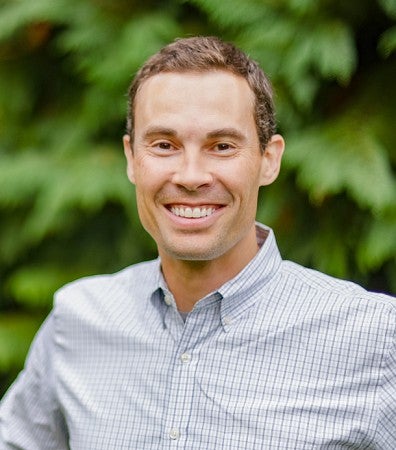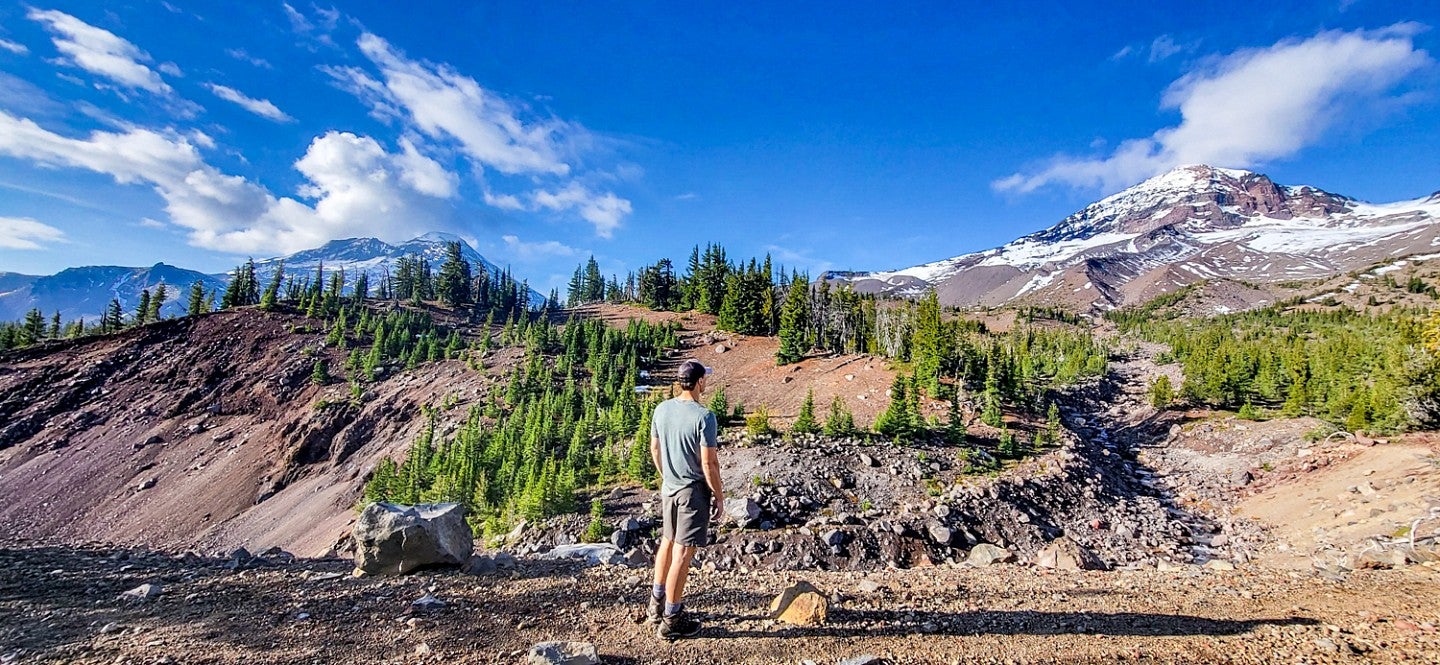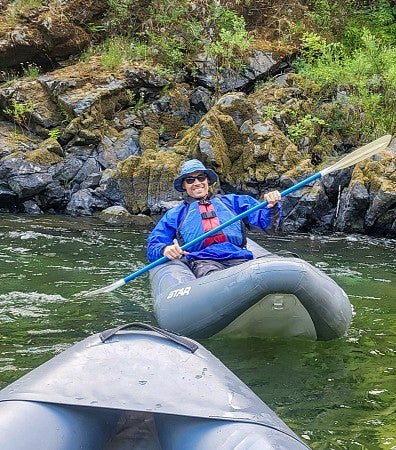
Ivan Miller
Visiting Professor of Practice in Sports Journalism
Hometown: I lived in Eugene from 2006 to 2007 while I was in the UO master’s program. I then moved up to Portland for a while before moving to Santa Fe, New Mexico. But I’ve been back in Eugene since 2010.
Hobbies: Over the past 15 years, I have done a decent amount of backpacking and mountaineering. This usually includes a 10-day expedition to the Sierra Nevada. Last year I used ice axes and crampons to enter the Miter Basin, where I was fortunate enough to spend four days without seeing another human outside of the people in my group.
I enjoy playing basketball, running and staying active in general. My goal is to be climbing in my 70s with my two sons. I have been coaching my sons in various sports for the past couple of years. Working with kids helps keep me young and on track to meet that goal.
Favorite books: This is tough. Hermann Hesse’s novel “Siddhartha” is a book I return to repeatedly. The meaning of the protagonist’s journey seems to change as I get older, but the premise of self-discovery still feels prevalent. Lately, I have been reading a lot of essays and books by Zadie Smith and Robert Macfarlane. Smith’s style and voice have evolved over time, and I appreciate her insights into the human experience. Macfarlane seems to push the boundaries of what it means to be a legitimate outdoor adventurer and good writer.
Favorite quote: Recently I reread chunks of Miguel de Cervantes’ “Don Quixote” for a story I wrote. Cervantes endured a lot of adversity in his life but forever changed the way we think about storytelling. He wrote, “In order to attain the impossible, one must attempt the absurd.” I think to some degree my life has been a mix of quixotic adventures, an incredible and, at times, nonsensical exploration of the world. I suppose I’m still exploring.
Favorite song: I remember being 19 and embarking on a three-month road trip by myself. At one point while driving through Montana’s Glacier National Park on a beautiful July evening, I listened to Jimi Hendrix’s album “Are You Experienced.” This was a time in which I had devoured some literature about Zen Buddhism and was really searching for anything transcendent. Enthralled by beauty all around me, the song “May This Be Love” came on and I hit the repeat button as I traveled back to my camp. Hendrix’s mind-bending guitar solo might be as close as an artist can come to perfection, and it perfectly summed up the moment, one in which I felt free to do whatever I wanted to do with my life. That’s a powerful epiphany at 19, and almost 25 years later, it still strikes a nerve.
Ivan Miller found his way in 2006 to UO, where he completed his master’s in magazine writing. His journey to journalism was fueled by a desire to make a difference after experiencing the devastation of Hurricane Katrina and feeling like the response was poorly handled. Over the years, he found the outlet for his passions for the outdoors, journalism and education by helping high school students publish a magazine about the outdoors, Backcountry Review. Whether he’s mountaineering in the Sierra Nevada or coaching third- and fourth-grade basketball, staying active and out in the world is a core part of who he is.
Miller has a love for sports journalism, which he sees as a way to unite people across multiple backgrounds. He hopes to spark this love in his students and guide them to discover their own voice in this dynamic field, highlighting the types of sports not immediately thought of in sports journalism.
As a UO teacher, Miller plans to blend old-school journalism with modern multimedia within the classroom. He emphasizes the importance of both traditional storytelling and the ability to adapt to today’s ever-changing journalistic landscape. He hopes to foster a sense of community among his students, encouraging them to take control of their narratives and embark on whatever path they choose.

Miller, in his own words, delved further into his career and projects.
What has had a substantial impact on your career?
Ivan Miller: The natural world has always proved inspirational. Mountaineering specifically has provided ample mental and physical challenges. Climbing can expand your view of what’s possible, and it can quickly bring you back down to earth. By purposefully facing the fear of death head-on in the mountains, I have better learned what it truly means to live, simplifying life to one step, one handhold at a time. Every summer I explore some facet of the outdoors. Sitting down in the dirt at the end of the day and reflecting on the toil of the day, epiphany and understanding often appear in abundance. Over the years, my outdoor adventures have greatly influenced what I do as an educator. Throughout my career, I have created experiential opportunities that hopefully offer the occasional transcendent moment for my students.
What’s a career project that you’re most proud of?
IM: The most meaningful project I’ve been a part of was creating an outdoor-themed magazine at the high school level. I worked with students to raise over $200,000 for the program over nine years. We produced a magazine called Backcountry Review. It started small, but by the end, we had developed a professional-level publication. Students were profiling top outdoor athletes and writing meaningful narratives. It was incredible to see the passion and drive in my students. They took ownership of the magazine.
Do you plan on bringing any experiences like outdoor-focused programs or excursions into your classes?
IM: Yes, I definitely hope to incorporate the same experiential education at the SOJC. Getting students out of their routines and into the world is the best firsthand way to learn. I also want to emphasize reflection, allowing students to think deeply about their work and the challenges they face. It’s important to take risks, make mistakes and learn from them — it’s a huge part of education. I hope to create a similar mentor relationship with students.
What made you join the SOJC staff?
IM: I was living in Louisiana after graduating from Loyola University in New Orleans. Then Hurricane Katrina hit, and I was frustrated with how Katrina was handled. I was living it and seeing how people were impacted. That was the catalyst for me to try to change the world. When I first started journalism, I moved to Eugene to join the UO master’s degree in magazine writing, and I just sort of fell into sports.
One day I was walking around campus, and I saw Tom Wheeler, who was a great professor and a mentor for me during my master’s program, riding his bicycle around. The leaves were falling and, I don’t know, something about it made me think that I wanted to be a part of that world. The seed was planted, but working at the SOJC wasn’t something I was actively pursuing. I started working at Springfield High School, ran an integrated outdoor program and was teaching college classes. I was really pushing it as far as I could from an educator’s point of view. I was getting high schoolers involved in journalism and loved it. Somewhere along the line there were discussions about having someone to teach sports reporting at UO, and I think my name was dropped.
I was offered a position teaching a Reporting II class last winter, then they asked me to teach an Advanced Story Development class. So when a sports journalism position opened up, I decided it would be pretty incredible and applied.

What do you hope to accomplish at the SOJC?
IM: I want to be part of the push toward more sports journalism. The world can be a crazy place, but I think sports is a unifier. It brings people together, draws audiences and brings people from all walks of life together, and there’s something special about that. I want to watch students open up, take the reins and feel like they’re accomplishing what they want to. Helping students find their place is incredibly rewarding, and I can’t wait to guide them through that.
What content do you focus on and how do you share it?
IM: This is a twofold answer, but I enjoy “old school” journalism: taking a pen to a notepad and just going out and exploring the world. That’s where I started, just going and capturing the story. It’s fascinating and a driving force behind why I like that so much.
But we’re also in the 21st century and everything rapidly changes. Journalists need to have all the skills we talk about — taking photos, learning InDesign, knowing how PR works, interviewing subjects and editing content. It’s all important, and being able to jump on anything makes you stronger in the field. But I think there is always something you hold above the rest, something you fall back on, and for me that’s the written word.
What is your favorite sport? And what is your favorite to cover?
IM: It’s changed over the years. As a kid, my favorite was basketball, and I’ve written some work focusing on college basketball. But in recent years I’ve developed a passion for mountaineering and climbing, which brings out fascinating stories about pushing human limits, and getting a deeper connection to climbers has been rewarding. I would say, currently, the answer to both questions is mountaineering and climbing.
What are three things you want every student to know about you?
IM: I think the difference between being a student and going pro starts with a simple switch of perspective. I really believe students can achieve anything. My job is to create educational experiences in which students can learn to take control of the narrative and be good storytellers. A secondary goal might be community creation. Sports journalism provides an opportunity for students to explore what it means to be human. Sports bring people from all walks of life together, and the journalist’s job is to capture the comedic, heroic, even tragic moments that connect us all. That’s a cool gig.
Honestly, I am less sage-on-the-stage and more a mentor, maybe with a dash of editor mixed in. The truth is, I can learn just as much from my students as they can learn from me, and that’s what it means to truly be a part of a community. I am blessed to have the opportunity to work with so many unique students in the SOJC, and I hope to build a strong sense of community in and out of class.
I think success in education is about helping students build confidence and feel in control of their growth. I want to help them feel empowered to pursue their passions.
—By Ethan Donahue, class of ’26
Ethan Donahue is a journalism major with a double major in history. He is part of the School of Journalism and Communication’s direct-admit and honors programs. He is also part of the Clark Honors College. He holds an interest in investigative and conflict journalism and is working on a thesis focusing on how journalism, propaganda and the U.S. government interact during conflicts.
